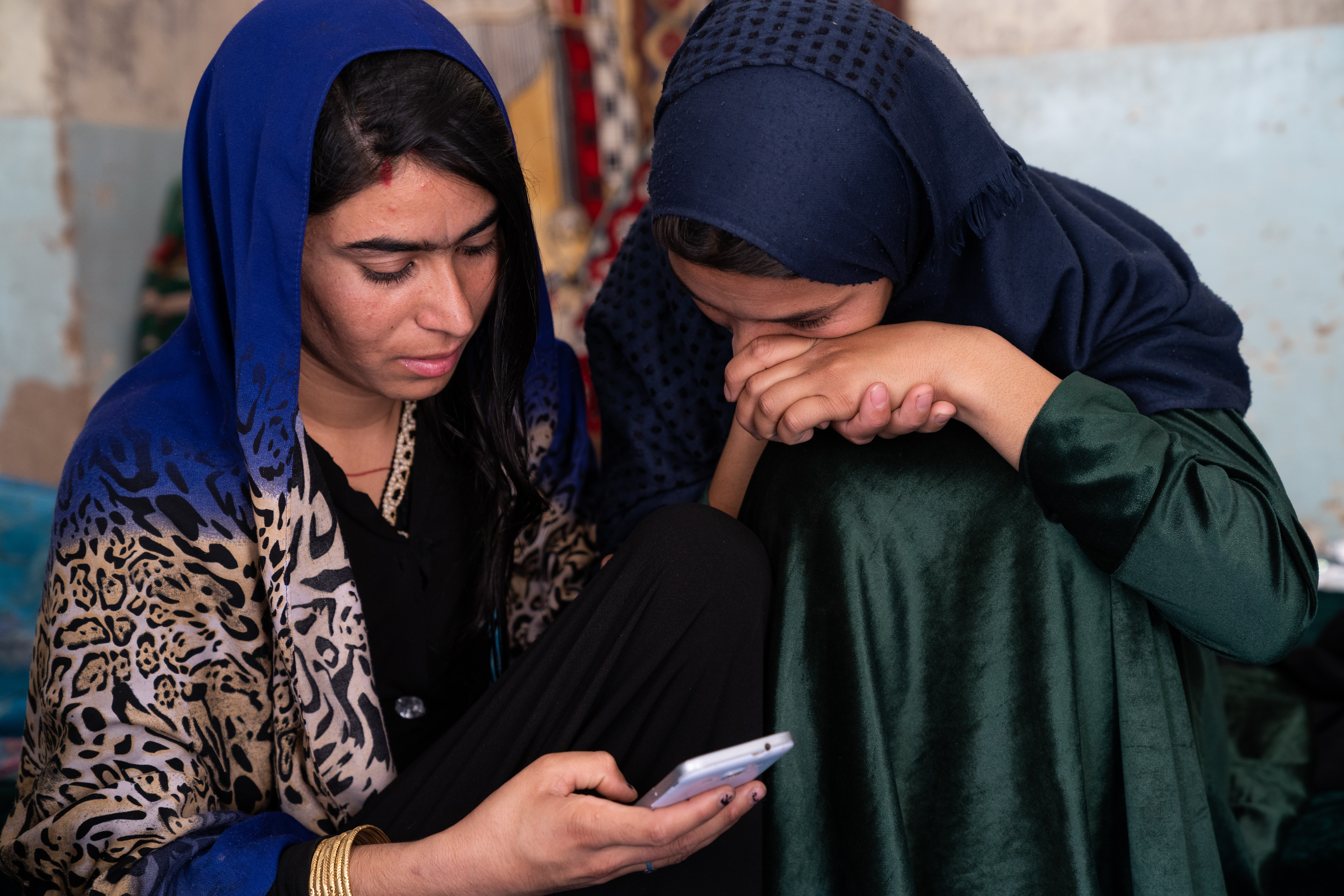Women's Rights & Issues
Related: About this forum'I'll be sacrificed': The lost and sold daughters of Afghanistan Child marriage, lack of education,
(a lengthy, horrifying, thoroughly depressing read.)
‘I’ll be sacrificed’: The lost and sold daughters of Afghanistan
Child marriage, lack of education, financial desperation – a year on from the Taliban takeover, what does the future hold for women and girls?
 ?resize=770%2C513
?resize=770%2C513
Two Afghan sisters look at a picture of their murdered sister, who they grieve
Aziz Gul’s sisters grieve their deceased sister [Matt Reichel/Al Jazeera]
By Robyn Huang
Published On 14 Aug 202214 Aug 2022
Herat, Afghanistan – The last time Aalam Gul Jamshidi saw her daughter was the night the 16 year old was married off to a man more than twice her age. Aziz Gul looked radiant in a sequinned, white wedding dress and a bright yellow headscarf, but there was fear in her otherwise solemn expressions. “If I go there, I’ll be sacrificed,” her mother remembers her daughter pleading that night last October. Aalam Gul had a sinking feeling but convinced herself it was just nerves. Aziz Gul’s marriage had been arranged four years prior and now that the time had come, she knew it was her duty to encourage her daughter into a new family. In Afghan culture, once a female marries, she moves in with her in-laws. Aziz Gul left her family’s home in Gozar Gah, a suburb of Herat, and moved to her new husband Musa’s home in Jawand, a rural district some 200km (124 miles) away – too far for her family to visit easily.
Five months later, the phone rang. It was Musa’s father calling to tell Aalam Gul that her daughter had been killed. Her naked body had been found in a forest just outside the village where she had lived with her in-laws. Aziz Gul had been beaten and shot four times in the back. She was 17 years old and four months pregnant. Aziz Gul’s family – ethnic Jamshidi Aimaq, self-described Tajik Arabs – are originally from Badghis province. They moved to Herat during the height of the conflict between the previous government and the Taliban, which retook control of the country after United States and NATO forces withdrew in August 2021.
Before the family left, when Aziz Gul was just 12, her parents agreed to marry her to Musa when she turned 16 – the minimum legal age for marriage in Afghanistan under the previous government. The Taliban has not mentioned whether that minimum age has changed. In exchange, her 26-year-old elder brother Aminullah would marry Musa’s 18-year-old niece, Shakar.
 ?w=770&resize=770%2C513
?w=770&resize=770%2C513
Aalam Gul shows a photo of her daughter Aziz Gul on her wedding night last year [Matt Reichel/Al Jazeera]
Across Afghanistan, it is common for children – particularly girls – to be married. Families arrange marriages to pay back personal debts, settle disputes, improve relations with rival families, or simply because they hope marriage will offer them protection from the worst extremes of economic hardship, and social and political upheaval.Though child marriage is not thoroughly tracked in Afghanistan, with gaps in concrete, holistic data about the number of children affected, UNICEF has reported children being sold as young as 20 days old for future marriage, with girls disproportionately affected. Now, amid spiralling poverty and the difficulty of finding sustainable jobs – only five percent of Afghan families have enough to eat daily, and inflation for essential household goods is at 40 percent (PDF) – even more families are struggling. Many are making desperate decisions to survive, including selling their children – specifically young daughters – into marriage or arranging their marriages in order to receive a dowry or mahr. The dowry, paid by the groom to the bride’s family, is a traditional practice in all marriages in Afghanistan, but more families are now seeking this to help them survive difficult financial times.
 ?w=770&resize=770%2C513
?w=770&resize=770%2C513
Aalam Gul and Khaja Abdul Ghafor Jamshidi grieve their daughter Aziz Gul, with their elder and younger daughters [Matt Reichel/Al Jazeera]
. . . . .
 ?w=770&resize=770%2C433
?w=770&resize=770%2C433
A picture of Aziz Gul dressed up in military fatigues
, left, and a picture of Aziz Gul after she was found killed [Matt Reichel/Al Jazeera]
 ?w=770&resize=770%2C513
?w=770&resize=770%2C513
Aziz Gul’s brothers and sisters share memories of their late sister through photos and her childhood drawings [Matt Reichel/Al Jazeera]
 ?w=770&resize=770%2C513
?w=770&resize=770%2C513
Raihana Mirzai, aged 10, is engaged to be married to her 20-year-old cousin [Matt Reichel/Al Jazeera]Raihana is dressed up for one reason only: she is engaged to be married to her 20-year-old cousin. It’s tradition to stay dressed up so that others will know that she is engaged, Shaima says.
. . . .
The young mother is afraid that her daughter will face the same fate, so she is adamant that Hosnia does not become a child bride. For now, she would rather they starve.“I cannot accept selling my daughter, so we will try to survive for now.”
https://www.aljazeera.com/features/2022/8/14/ill-be-sacrificed-the-lost-and-sold-daughters-of-afghanistan
Bayard
(28,996 posts)Girls as a commodity, used and tossed aside.
![]()
